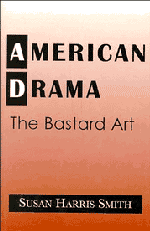Book contents
- Frontmatter
- Contents
- Acknowledgments
- 1 Introduction: The Problem of American Drama
- 2 Generic Hegemony: The Exclusion of American Drama
- 3 No Corner in Her Own House: What Is American About American Drama?
- 4 Did She Jump or Was She Pushed? American Drama in the University Curriculum
- 5 Caught in the Close Embrace: Sociology and Realism
- 6 Conclusion: Beyond Hegemony and Canonicity
- References
- Index
6 - Conclusion: Beyond Hegemony and Canonicity
Published online by Cambridge University Press: 10 November 2009
- Frontmatter
- Contents
- Acknowledgments
- 1 Introduction: The Problem of American Drama
- 2 Generic Hegemony: The Exclusion of American Drama
- 3 No Corner in Her Own House: What Is American About American Drama?
- 4 Did She Jump or Was She Pushed? American Drama in the University Curriculum
- 5 Caught in the Close Embrace: Sociology and Realism
- 6 Conclusion: Beyond Hegemony and Canonicity
- References
- Index
Summary
The primary problem of American drama seems to be located in the convergence of its two components, as if the union of “American” and “drama” were a coupling of the worst elements of both, carrying with it only the tainted characteristics and none of the approved qualities. In the hierarchized categories of genre, drama, too closely aligned with entertainment and with emotion, has been affixed in the cement shoes of high critical disdain and sunk to the murky bottom of academe; as well, in the longstanding competition between teachers and scholars of English and American literatures for control of the discipline, American is the lesser force. The fact that the most canonized figure in the discipline of English literary studies, Shakespeare, was primarily a dramatist does nothing to mitigate the sin of drama. But to accept this double damnation would be to arrive at a worrying conclusion: that the problem of American drama is the problem of cultural capital and that American drama has none because it is not “literature,” nor is it wholly “American,” nor does it belong in higher education, nor is it free from the stranglehold of realism. Yet all of these assertions, I have been arguing, are not true but are manufactured constructs, the products of a matrix offerees that has distorted and simplified nearly beyond recognition the rich and complicated history of American drama largely still buried under narrow canonicity, hegemonic New Criticism, theoretical indifference, and academic shortsightedness and only recently unearthed, dusted off, and looked at in the brighter light of culture and performance studies.
- Type
- Chapter
- Information
- American DramaThe Bastard Art, pp. 197 - 207Publisher: Cambridge University PressPrint publication year: 1997



